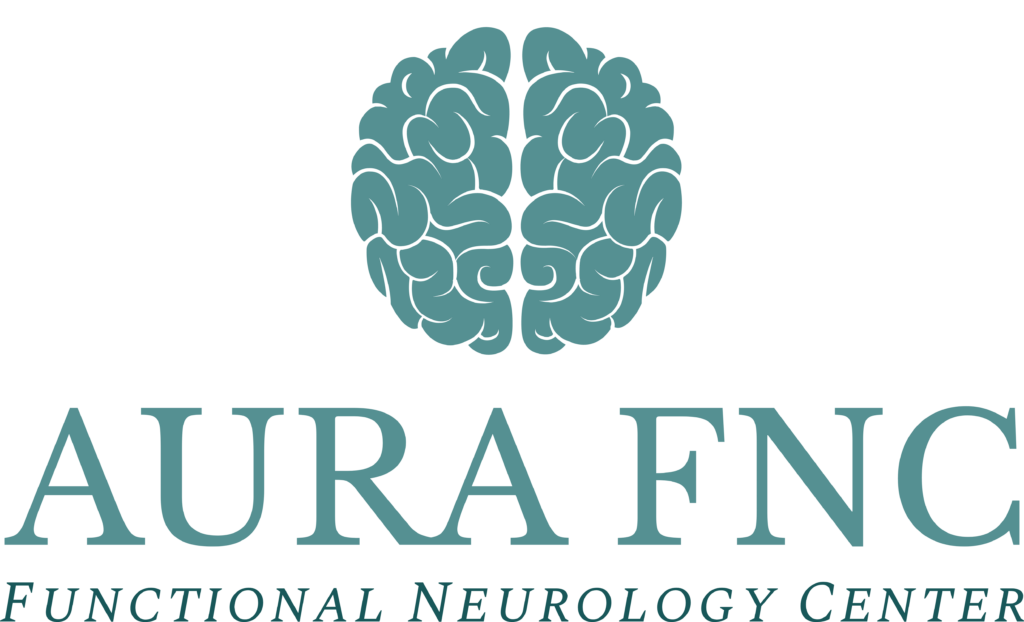Concussion
What is a Concussion (mTBI)?
A concussion is also known as a mild traumatic brain injury (an mTBI, or a specific type of TBI) that we treat at Aura FNC. Experts have been changing the exact definition and plan of action for concussion recovery since the year 2000. Typically concussions occur as a result of a blow to the head, violent shaking, or a forceful impact that jars the brain within the skull.
Despite being associated with the word “mild”, concussions can have significant implications for neurological function. The injury temporarily disrupts normal brain function, leading to symptoms that can affect cognitive, emotional, and physical well-being.
Concussions are commonly associated with sports-related activities, falls, car accidents (MVA), and other situations involving head trauma. The significance lies in the immediate effects and the potential for lingering symptoms, necessitating thorough evaluation and care by functional neurologists and healthcare professionals.
A comprehensive understanding of concussions is paramount for effective management using functional neurology and concepts from applied clinical neuroscience. Our goal at Aura FNC is to ensure the well-being and long-term neurological health of individuals who have a history of concussions and traumatic brain injury.

Dr. Diana Tyler DC, DACNB
Founder of Aura Functional Neurology Center with experience treating patients diagnosed with a concussion (mTBI) at the Aura FNC office located in Cumming, Georgia, right outside of the Atlanta area. Doctor of Chiropractic and Functional Neurologist. Graduate of Palmer College of Chiropractic and a Diplomate of the American Chiropractic Neurology Board.

Prevalence of Concussions
Concussions are a prevalent form of traumatic brain injury that contribute to a substantial number of emergency room visits and hospitalizations globally. While the true prevalence is challenging to determine accurately due to underreporting and variations in diagnostic criteria, it is estimated that millions of concussions occur annually.
Sports-related activities, particularly contact sports, are a major source of concussions, impacting athletes across various age groups. Additionally, concussions can occur in everyday scenarios, such as specific types of hands-on labor-intensive jobs, or slipping and falling. The increased awareness of concussion risks has led to improved recognition and management, emphasizing the importance of early intervention to minimize potential long-term consequences.
More concussion patients are coming to functional neurologists like Dr. Diana Tyler for help due to the complex nature of concussions. Aura Functional Neurology Center looks at concussions from a holistic perspective, looking at the brain, mind, and body together as one whole system. Another benefit we’ve found is tailoring every concussion neurorehabilitation program to meet our patient’s unique needs, as many concussions need their own unique treatment program.
Concussion Symptoms and Diagnosis
Concussions manifest with various symptoms that can be categorized into cognitive, emotional, and physical domains. Cognitive symptoms may include difficulties with concentration, memory, difficulty with word finding, brain fog, and processing information. Emotional symptoms may involve irritability, mood swings, and heightened emotional responses.
Physical symptoms often encompass headaches, dizziness, nausea, and sensitivity to light or noise. It’s crucial to note that symptoms may not always appear immediately and can evolve over time. While some individuals may experience a quick resolution of symptoms, others may face prolonged challenges, necessitating comprehensive evaluation and management.
How Concussion is Diagnosed
Diagnosing a concussion involves a combination of clinical assessment, patient history, and, in some cases, neuroimaging. Healthcare professionals utilize standardized concussion assessment tools to evaluate cognitive function, balance, and coordination. The Sport Concussion Assessment Tool (SCAT) is commonly employed in sports settings to assess symptoms, cognition, and balance.
Neuroimaging, such as computed tomography (CT) scans or magnetic resonance imaging (MRI), may be conducted to rule out more severe brain injuries. However, it’s important to note that imaging may not always reveal abnormalities in mild concussions. Diagnosis relies heavily on a comprehensive evaluation of the individual’s symptoms, medical history, and neurological examination, highlighting the need for a multidimensional approach to accurately assess and manage concussions.
While we don’t have these diagnostic testing tools at Aura FNC, Dr. Diana Tyler will co-manage with a primary care provider or any other doctors whom her patients are regularly working with for their concussion case or any other neurorehabilitation treatments currently underway.
Concussion Rehabilitation Programs
Dr. Diana Tyler offers concussion treatment in the form of a 5-day, 10-day, or 15-day brain rehabilitation program at the Aura Functional Neurology Center office in Cumming, Georgia. These rehabilitation programs are customized to patients based on their symptoms and unique needs. Many of our patients who come for concussion treatment at Aura FNC will travel from other cities in Georgia, fly in from other states around the U.S.A., and some will even travel internationally for our concussion rehabilitation programs.
Dr. Diana Tyler treats concussion cases from a functional and neurological perspective using neuroplasticity and brain training to positively influence the complex interactions between genetics, environmental factors, and changes in brain chemistry that surround concussion. She focuses on strengthening the area of the brain dysfunction that is contributing to your concussion symptoms while also addressing the contributing structural and metabolic factors.
Concussion treatment at Aura FNC involves a combination of lifestyle and dietary modifications, nutritional support, neurological rehabilitation, and treatment of the spine. Our approach is based on Chiropractic Functional Neurology and the latest research in clinical neuroscience.
Aura FNC, a private practice with limited capacity, accepts a restricted number of patients annually for our neurodevelopmental rehabilitation programs. This allows for personalized 1:1 sessions with Dr. Diana Tyler, offering 15, 30, or 45 hours of individual treatment across 1, 2, or 3 weeks in a private office setting.
Concussion Causes and Risk Factors
Concussions can result from various causes, with the common denominator being a forceful impact or blow to the head or body that transmits force to the brain. Mild traumatic brain injuries (mTBI) encompass concussions and can occur in situations such as common household falls, motorcycle accidents, or physical altercations at work or accidentally. In sports, particularly contact sports like football, soccer, and hockey, athletes are susceptible to concussions due to collisions, tackles, or hits.
Additionally, non-sport-related activities that involve the risk of head injury, such as cycling at the park or recreational activities, contribute to the overall incidence of concussions. Understanding the diverse causes of concussions is essential for implementing preventive measures and promoting safety awareness in various settings such as wearing a helmet when getting on a bicycle.
Mild traumatic brain injuries (mTBI)
Concussions fall under the category of mild traumatic brain injuries, which are characterized by a disruption in normal brain function without significant structural damage visible on traditional imaging. The term “mild” can be misleading, as the consequences of concussions can vary widely, and some individuals may experience prolonged or severe symptoms.
The primary mechanism behind mild traumatic brain injuries involves the sudden acceleration or deceleration of the head, leading to the brain’s movement within the skull. This movement can result in stretching and damage to brain cells, triggering a cascade of neurochemical changes. Despite the absence of detectable structural abnormalities on imaging, the functional disturbances in brain activity during a concussion underscore the significance of these injuries and the need for careful assessment and management.
Loss of consciousness
While loss of consciousness was traditionally considered a hallmark symptom of a concussion, it is now recognized that the majority of concussions occur without a loss of consciousness. Loss of consciousness is just one possible manifestation of a traumatic brain injury and does not necessarily correlate with the severity of the injury or the presence of persistent symptoms. Many individuals with concussions may remain conscious throughout the entire event.
The focus has shifted to a more comprehensive evaluation of symptoms and cognitive function to determine the extent of the injury and guide appropriate management strategies. Loss of consciousness is just one piece of the diagnostic puzzle, and functional neurology professionals consider a broader range of factors to assess the impact of a concussion on an individual’s neurological, functional, and structural brain health and well-being.
Previous concussions
Having a history of previous concussions increases the risk of sustaining subsequent concussions. Individuals who have experienced one concussion may be more susceptible to future injuries, and the cumulative effects of multiple concussions can lead to more severe and prolonged symptoms. This heightened vulnerability emphasizes the importance of proper management and recovery after each concussion to minimize the risk of subsequent injuries.
Athletes, in particular, are advised to follow established return-to-play protocols to ensure sufficient recovery time and reduce the risk of reinjury. Understanding the impact of previous concussions on current and future well-being is crucial for implementing preventive measures and fostering a proactive approach to head injury management.
Physical activity and sports-related injuries
Engaging in physical activity, particularly in sports that involve contact or collision, increases the risk of sustaining a concussion. High-impact sports like football, rugby, and hockey pose inherent risks due to the potential for collisions and abrupt changes in movement. Athletes participating in these sports are more prone to head injuries, emphasizing the need for comprehensive concussion prevention strategies, including proper equipment, rule enforcement, and education on recognizing and reporting symptoms.
The nature of sports-related injuries introduces unique challenges in managing concussions, as athletes often desire a quick return to play. Balancing the competitive demands of sports with the importance of ensuring complete recovery is essential to protect the long-term neurological health of individuals involved in physical activities and sports.
Concussion Triggers
Concussion triggers are specific circumstances or activities that can precipitate or exacerbate symptoms in individuals who have experienced a concussion. It’s crucial to identify and manage these triggers to promote optimal recovery and minimize the risk of symptom recurrence. Common triggers for concussions include:
- Physical exertion:
Strenuous physical activity or engaging in activities that involve sudden movements can trigger or worsen concussion symptoms. - Visual stimuli:
Exposure to bright lights, screens, or visually stimulating environments may exacerbate symptoms such as headaches, dizziness, and visual disturbances. - Cognitive demands:
Activities requiring intense concentration, multitasking, or prolonged cognitive effort can trigger cognitive symptoms in individuals recovering from a concussion. - Emotional stress:
Emotional stressors, including anxiety and emotional distress, may contribute to the exacerbation of concussion symptoms. - Lack of sleep:
Inadequate or disrupted sleep patterns can negatively impact concussion recovery and trigger fatigue, headaches, and cognitive difficulties. - Dehydration:
Insufficient fluid intake can exacerbate symptoms such as headaches and dizziness, emphasizing the importance of maintaining proper hydration and electrolytes during recovery. - Physical contact or jarring movements:
Engaging in activities that involve physical contact or sudden jarring movements can worsen symptoms and delay the healing process.
Understanding and mitigating these triggers is integral to the comprehensive management of concussion, facilitating a smoother recovery process and reducing the likelihood of symptom aggravation.
